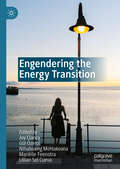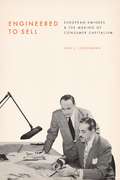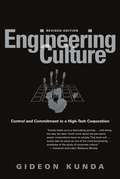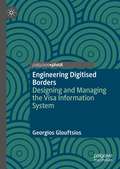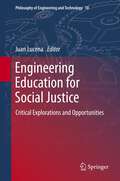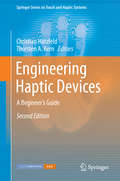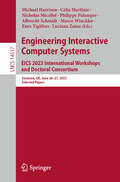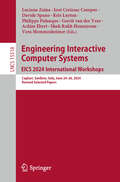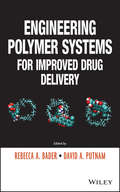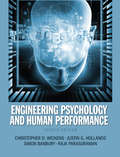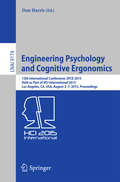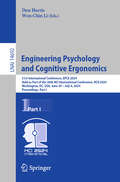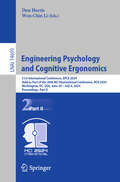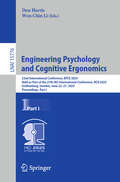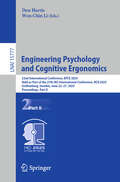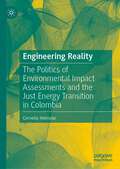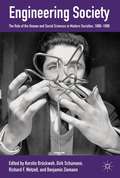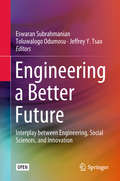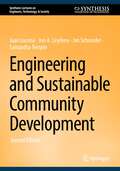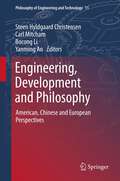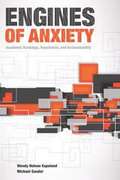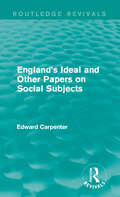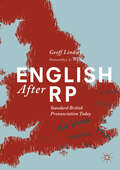- Table View
- List View
Engendering the Energy Transition
by Gül Özerol Joy Clancy Nthabiseng Mohlakoana Mariëlle Feenstra Lillian Sol CuevaThis book brings together diverse contributions exploring the integration of gender equality in current national energy policies and international energy frameworks across the Global South and North. Taking a multi-disciplinary approach, this collection contributes to building a body of independent empirical evidence about the impacts of the energy transition on socio-economic outcomes, with a focus on gender differentiated choices of energy forms. The book includes short reflections in each chapter allowing the reader to explore the content from an alternative perspective. The common thread enabling the book to actively contribute to engendering the energy transition is its approach to the topic from a primarily ‘gender’ driven perspective. The book draws many useful lessons from practice and shares gender mainstreaming tools for use across the Global South and the North. Such an approach brings novel insights from theoretical, methodological and practical perspectives, which further promotes cross-disciplinary learning and will be of interest to researchers and practitioners from across the Energy and Gender disciplines.
Engineered to Sell: European Émigrés and the Making of Consumer Capitalism
by Jan L. LogemannThe mid-twentieth-century marketing world influenced nearly every aspect of American culture—music, literature, politics, economics, consumerism, race relations, gender, and more. In Engineered to Sell, Jan L. Logemann traces the transnational careers of consumer engineers in advertising, market research, and commercial design who transformed capitalism from the 1930s through the 1960s. He argues that the history of marketing consumer goods is not a story of American exceptionalism. Instead, the careers of immigrants point to the limits of the “Americanization” paradigm. Logemann explains the rise of a dynamic world of goods and examines how and why consumer engineering was shaped by transatlantic exchanges. From Austrian psychologists and little-known social scientists to the illustrious Bauhaus artists, the emigrés at the center of this story illustrate the vibrant cultural and commercial connections between metropolitan centers: Vienna and New York; Paris and Chicago; Berlin and San Francisco. By focusing on the transnational lives of emigré consumer researchers, marketers, and designers, Engineered to Sell details the processes of cultural translation and adaptation that mark both the midcentury transformation of American marketing and the subsequent European shift to “American” consumer capitalism.
Engineering Culture: Control and Commitment in a High-Tech Corporation
by Gideon KundaEngineering Culture is an award-winning ethnography of the engineering division of a large American high-tech corporation. Now, this influential book—which has been translated into Japanese, Italian, and Hebrew—has been revised to bring it up to date. In Engineering Culture, Gideon Kunda offers a critical analysis of an American company's well-known and widely emulated "corporate culture. " Kunda uses detailed descriptions of everyday interactions and rituals in which the culture is brought to life, excerpts from in-depth interviews and a wide variety of corporate texts to vividly portray managerial attempts to design and impose the culture and the ways in which it is experienced by members of the organization. The company's management, Kunda reveals, uses a variety of methods to promulgate what it claims is a non-authoritarian, informal, and flexible work environment that enhances and rewards individual commitment, initiative, and creativity while promoting personal growth. The author demonstrates, however, that these pervasive efforts mask an elaborate and subtle form of normative control in which the members' minds and hearts become the target of corporate influence. Kunda carefully dissects the impact this form of control has on employees' work behavior and on their sense of self. In the conclusion written especially for this edition, Kunda reviews the company's fortunes in the years that followed publication of the first edition, reevaluates the arguments in the book, and explores the relevance of corporate culture and its management today.
Engineering Digitised Borders: Designing and Managing the Visa Information System
by Georgios GlouftsiosThis book focuses on the Visa Information System (VIS): a large-scale data infrastructure interconnecting a multiplicity of state authorities that enact border security and migration management in the European Union. The VIS is embedded within a setting of pan-European IT systems that filter international mobility, identify threatening elements, hamper the travels of poor, racialized, and alienated subjects, while at the same time facilitate the circulation of those expected to generate financial and other kinds of capital. The book examines the engineering of the VIS by analyzing how it was designed before its deployment in the field of border security, and how it is maintained to ensure continuous and secure operation. It illustrates how engineering processes that render the VIS functional are not just technoscientific, but inherently political, as they (re)configure and maintain the power to govern international mobility by digital means.
Engineering Education for Social Justice: Critical Explorations and Opportunities
by Juan LucenaHoping to help transform engineering into a more socially just field of practice, this book offers various perspectives and strategies while highlighting key concepts and themes that help readers understand the complex relationship between engineering education and social justice. This volume tackles topics and scopes ranging from the role of Buddhism in socially just engineering to the blinding effects of ideologies in engineering to case studies on the implications of engineered systems for social justice. This book aims to serve as a framework for interventions or strategies to make social justice more visible in engineering education and enhance scholarship in the emerging field of Engineering and Social Justice (ESJ). This creates a 'toolbox' for engineering educators and students to make social justice a central theme in engineering education.
Engineering Haptic Devices
by Christian Hatzfeld Thorsten A. KernIn this greatly reworked second edition of Engineering Haptic Devices the psychophysic content has been thoroughly revised and updated. Chapters on haptic interaction, system structures and design methodology were rewritten from scratch to include further basic principles and recent findings. New chapters on the evaluation of haptic systems and the design of three exemplary haptic systems from science and industry have been added. This book was written for students and engineers that are faced with the development of a task-specific haptic system. It is a reference book for the basics of haptic interaction and existing haptic systems and methods as well as an excellent source of information for technical questions arising in the design process of systems and components. Divided into two parts, part 1 contains typical application areas of haptic systems and a thorough analysis of haptics as an interaction modality. The role of the user in the design of haptic systems is discussed and relevant design and development stages are outlined. Part II presents all relevant problems in the design of haptic systems including general system and control structures, kinematic structures, actuator principles and sensors for force and kinematic measures. Further chapters examine interfaces and software development for virtual reality simulations.
Engineering Interactive Computer Systems. EICS 2023 International Workshops and Doctoral Consortium: Swansea, UK, June 26-27, 2023, Selected Papers (Lecture Notes in Computer Science #14517)
by Michael Harrison Marco Winckler Philippe Palanque Albrecht Schmidt Célia Martinie Nicholas Micallef Enes Yigitbas Luciana ZainaThis book presents a series of revised papers selected from the Doctoral Consortium (DC) and the Workshops organized in conjunction with the 15th ACM SIGCHI Symposium on Engineering Interactive Computing Systems (EICS 2023) which was held in Swansea, United Kingdom, during June 27-30, 2023. The 17 full papers included in this book were carefully reviewed and selected from 33 submissions. They were organized in topical sections as follows: engineering interactive computing systems for people with disabilities (DISAB 2023 Workshop), engineering interactive systems embedding AI technologies (EIS-embedding-AI Workshop) and doctoral consortium EICS 2023.
Engineering Interactive Computer Systems. EICS 2024 International Workshops: Cagliari, Sardinia, Italy, June 24–28, 2024, Revised Selected Papers (Lecture Notes in Computer Science #15518)
by Philippe Palanque Achim Ebert Shah Rukh Humayoun Gerrit van der Veer Kris Luyten Luciana Zaina José Creissac Campos Davide Spano Vera MemmesheimerThis book presents a series of revised papers selected from the Workshops organized in conjunction with the 16th ACM SIGCHI Symposium on Engineering Interactive Computing Systems (EICS 2024) which was held in Cagliari, Italy, during June 24–26, 2024. The 18 full papers included in this book were carefully reviewed and selected from 22 submissions. They were organized in topical sections as follows: Engineering Interactive Systems Embedding AI Technologies (EISEAIT 2024 Workshop); and Experience 2.0 and Beyond – Engineering Cross Devices and Multiple Realities (EXDMR 2024).
Engineering Polymer Systems for Improved Drug Delivery
by David A. Putnam Rebecca A. BaderPolymers have played a critical role in the rational design and application of drug delivery systems that increase the efficacy and reduce the toxicity of new and conventional therapeutics. Beginning with an introduction to the fundamentals of drug delivery, Engineering Polymer Systems for Improved Drug Delivery explores traditional drug delivery techniques as well as emerging advanced drug delivery techniques. By reviewing many types of polymeric drug delivery systems, and including key points, worked examples and homework problems, this book will serve as a guide to for specialists and non-specialists as well as a graduate level text for drug delivery courses.
Engineering Psychology & Human Performance: International Edition
by Raja Parasuraman Christopher D. Wickens Simon Banbury Justin G. HollandsForming connections between human performance and design Engineering Psychology and Human Performance, 4e examines human-machine interaction. The book is organized directly from the psychological perspective of human information processing. The chapters generally correspond to the flow of information as it is processed by a human being--from the senses, through the brain, to action--rather than from the perspective of system components or engineering design concepts. This book is ideal for a psychology student, engineering student, or actual practitioner in engineering psychology, human performance, and human factors Learning Goals Upon completing this book, readers should be able to: * Identify how human ability contributes to the design of technology. * Understand the connections within human information processing and human performance. * Challenge the way they think about technology's influence on human performance. * show how theoretical advances have been, or might be, applied to improving human-machine interaction
Engineering Psychology and Cognitive Ergonomics
by Don HarrisThis is the sixth edited volume of refereed contributions, from an international group of researchers and specialists. Volumes five and six comprise the edited proceedings of the Third International Conference on Engineering Psychology and Cognitive Ergonomics, organized by Cranfield College of Aeronautics, Edinburgh, Scotland, October 2000. The applications areas include aerospace and other transportation, medicine, human-computer interaction, process control, and training technology. Topics addressed include: the design of control and display systems; human perception, error, reliability, information processing, and performance modelling; mental workload; stress; automation; situation awareness; skill acquisition and retention; techniques for evaluating human-machine systems and the physiological correlates of performance. Both volumes will be useful to applied and occupational psychologists, instructors, instructional developers, equipment and systems designers, researchers, government regulatory personnel, human resource managers and selection specialists; also to senior pilots, air traffic control and aviation and ground transportation operations management.
Engineering Psychology and Cognitive Ergonomics: 21st International Conference, EPCE 2024, Held as Part of the 26th HCI International Conference, HCII 2024, Washington, DC, USA, June 29 – July 4, 2024, Proceedings, Part I (Lecture Notes in Computer Science #14692)
by Don Harris Wen-Chin LiThis two-volume set LNAI 14692–14693 constitutes the thoroughly refereed proceedings of the 21st International Conference on Engineering Psychology and Cognitive Ergonomics, EPCE 2024, held as part of HCI International 2024,held in Washington, DC, USA, during June 29 - July 4, 2024. The total of 1271 papers and 309 posters included in the HCII 2024 proceedings was carefully reviewed and selected from 5108 submissions. The papers included in the HCII-EPCE two-volume set were organized in topical sections as follows: Part I: Cognitive Processes and Performance in High-Stress Environments; Decision-Making Support and Automation. Part II: Engineering Psychology and User Experience; Human Factors in Aviation.
Engineering Psychology and Cognitive Ergonomics: 21st International Conference, EPCE 2024, Held as Part of the 26th HCI International Conference, HCII 2024, Washington, DC, USA, June 29 – July 4, 2024, Proceedings, Part II (Lecture Notes in Computer Science #14693)
by Don Harris Wen-Chin LiThis two-volume set LNAI 14692–14693 constitutes the thoroughly refereed proceedings of the 21st International Conference on Engineering Psychology and Cognitive Ergonomics, EPCE 2024, held as part of HCI International 2024,held in Washington, DC, USA, during June 29 - July 4, 2024. The total of 1271 papers and 309 posters included in the HCII 2024 proceedings was carefully reviewed and selected from 5108 submissions. The papers included in the HCII-EPCE two-volume set were organized in topical sections as follows: Part I: Cognitive Processes and Performance in High-Stress Environments; Decision-Making Support and Automation. Part II: Engineering Psychology and User Experience; Human Factors in Aviation.
Engineering Psychology and Cognitive Ergonomics: 22nd International Conference, EPCE 2025, Held as Part of the 27th HCI International Conference, HCII 2025, Gothenburg, Sweden, June 22–27, 2025, Proceedings, Part I (Lecture Notes in Computer Science #15776)
by Don Harris Wen-Chin LiThis two-volume set constitutes the thoroughly refereed proceedings of the 22nd International Conference on Engineering Psychology and Cognitive Ergonomics, EPCE 2025, held as part of HCI International 2025, held in Gothenburg, Sweden, during June 22–27, 2025. Two volumes of the HCII 2025 proceedings are dedicated to this year&’s edition of the EPCE conference. The first volume centers around a diverse array of interconnected themes related to human performance, workload and situational awareness in the use of complex interactive applications and environments, as well as the role of cognitive psychology on designing and evaluating interactive systems and investigating computer-supported as in collaboration and teaming. The second volume focuses on issues related to Cognitive Psychology in the demanding contexts of aviation and space.
Engineering Psychology and Cognitive Ergonomics: 22nd International Conference, EPCE 2025, Held as Part of the 27th HCI International Conference, HCII 2025, Gothenburg, Sweden, June 22–27, 2025, Proceedings, Part II (Lecture Notes in Computer Science #15777)
by Don Harris Wen-Chin LiThis two-volume set constitutes the thoroughly refereed proceedings of the 22nd International Conference on Engineering Psychology and Cognitive Ergonomics, EPCE 2025, held as part of HCI International 2025, held in Gothenburg, Sweden, during June 22–27, 2025. Two volumes of the HCII 2025 proceedings are dedicated to this year&’s edition of the EPCE conference. The first volume centers around a diverse array of interconnected themes related to human performance, workload and situational awareness in the use of complex interactive applications and environments, as well as the role of cognitive psychology on designing and evaluating interactive systems and investigating computer-supported as in collaboration and teaming. The second volume focuses on issues related to Cognitive Psychology in the demanding contexts of aviation and space.
Engineering Reality: The Politics of Environmental Impact Assessments and the Just Energy Transition in Colombia
by Cornelia HelmckeEngineering Reality offers unprecedented insights into the power of environmental impact assessments in engineering a reality favourable to any investment, focusing on the highly contested environmental study of a large hydroelectric dam project in southern Colombia, El Quimbo. The inclusion of environmental impact assessments to project proposals of environmental influence has been an undeniably important step to environmental governance in many countries around the world. Regarding the science behind these studies as objective and their results as the closest in representing reality, however, is misleading. Many activists and scholars made it their mission to uncover the limitations and work towards filling the gaps. Participation processes are considered key to any successful evaluation, but local knowledges and alternative perspectives are still often disqualified through more widely accepted scientific methods. Engineering Reality systematically walks through and accounts for the shortcomings and injustices associated with environmental monitoring. It compares the reality as presented in the dam’s environmental impact study with first-hand accounts from the local and affected populations and observations gathered through two periods of fieldwork in 2012 (before) and 2016-17 (after the dam started operating). It explores how the knowledge of the study was used politically and to what end. Bringing the findings in conversation with the wider environmental impact assessment literature, the book proposes a new framework to assess energy projects -Energy Data Justice- that regards the environmental impact assessment a strictly political tool aimed at reaching the just energy transition in Colombia and worldwide.
Engineering Society
by Benjamin Ziemann Dirk Schumann Richard F. Wetzell Kerstin BrückwehExplaining crime by reference to abnormalities of the brain is just one example of how the human and social sciences have influenced the approach to social problems in Western societies since 1880. Focusing on applications such as penal policy, therapy, and marketing, this volume examines how these sciences have become embedded in society.
Engineering a Better Future: Interplay between Engineering, Social Sciences, and Innovation
by Eswaran Subrahmanian Toluwalogo Odumosu Jeffrey Y. TsaoThis open access book examines how the social sciences can be integrated into the praxis of engineering and science, presenting unique perspectives on the interplay between engineering and social science. Motivated by the report by the Commission on Humanities and Social Sciences of the American Association of Arts and Sciences, which emphasizes the importance of social sciences and Humanities in technical fields, the essays and papers collected in this book were presented at the NSF-funded workshop ‘Engineering a Better Future: Interplay between Engineering, Social Sciences and Innovation’, which brought together a singular collection of people, topics and disciplines. The book is split into three parts: A. Meeting at the Middle: Challenges to educating at the boundaries covers experiments in combining engineering education and the social sciences; B. Engineers Shaping Human Affairs: Investigating the interaction between social sciences and engineering, including the cult of innovation, politics of engineering, engineering design and future of societies; and C. Engineering the Engineers: Investigates thinking about design with papers on the art and science of science and engineering practice.
Engineering and Sustainable Community Development (Synthesis Lectures on Engineers, Technology, & Society)
by Jen Schneider Juan Lucena Jon A. Leydens Samantha TempleThis book presents an overview of engineering as it relates to humanitarian engineering, service-learning engineering, peace engineering, or engineering for community-led development, programs that are often grouped under Engineering for Good or Engineering for Change. By placing “community” at the center of these endeavors, this book invites readers and practitioners to strive for sustainable community development (SCD). This 2nd edition is centered on new concepts of community-led development and includes topics on the history of engineers and development, the problems of using industry-based practices when designing for communities, how engineers can prepare to work with communities, and listening in community development. Two case studies are provided to highlight the book’s concepts using first-hand experiences of engineers engaged with communities—one of engineers developing a windmill for a community in India, and a second of an engineer mapping communities in Honduras for improved water management. The book concludes with student perspectives and experiences from a curricular model focused on engineering for sustainable community development. Overall, the text invites engineers to reflect and prepare themselves for global careers that involve international development in both the for-profit and non-profit sectors. This 2nd edition places community-led practices at the heart of these endeavors. The book is for engineering faculty, students and practicing engineers, involved in current or future community collaborations. The authors wrote this book with a goal to help readers critically reflect on their own practices and perceptions. Readers learn to question past, current, and future frameworks in the project of development, and are encouraged to adopt practices of community-led development. This 2nd edition is aimed at engineering students who, as future global engineers, are faced with opportunities and challenges when working with communities. As funding for renewable energy, “green jobs,” and community-based initiatives continue to increase, engineers will need to rely on the social and historical concepts presented in this book.
Engineering, Development and Philosophy
by Carl Mitcham Steen Hyldgaard Christensen Yanming An Bocong LiThis inclusive, cross-cultural study rethinks the nexus between engineering, development, and culture. It offers diverse commentary from a range of disciplinary perspectives on how the philosophies of today's cultural triumvirate--American, European and Chinese--are shaped and given nuance by the cross-fertilization of engineering and development. Scholars from the humanities and social sciences as well as engineers themselves reflect on key questions that arise in this relational context, such as how international development work affects the professional views, identities, practice and ethics of engineers. The first volume to offer a systematic and collaborative study that cuts across continental boundaries, the book delineates the kinds of skills and competences that tomorrow's engineering success stories will require, and analyzes fascinating aspects of the interplay between engineering and philosophy, such as how traditionally Chinese ways of thinking can influence modern engineering practice in the world's most populous country. China's problematic mix of engineering woes and wonders, from the high-profile crash on its high-profile rail network to its 'bird's nest' Olympic stadium, adds to the urgency for reform, while Europe's Enlightenment-informed legal frameworks are contrasted with Chinese mechanisms in their governance of the field of nanotechnology, a crucial element of future technical evolution. Fascinating and compelling in equal measure, this volume addresses one of the topics at the leading edge of humanity's quest to survive, and to thrive.
Engineers in Germany: Social Situation, Mentalities and Politics 1890-1933
by Tobias SanderEngineers represent the (industrial) modern age like no other profession. In the German Empire and the Weimar Republic, however, the enormous numerical expansion of the profession was contrasted by comparatively unfavorable working conditions and incomes. This was particularly true of the graduate engineers, whose academization failed to meet industrial requirements. Can the völkisch, right-wing political radicalization of many technical experts on the eve of the 'Third Reich' actually be fully explained by these professional-social frictions?Data on the professional-social situation, consumption, leisure time and political behaviour of engineers in the higher and academic professions, which have been made available for the first time, already reveal the contours of late-modern, contemporary society in the period under consideration. This makes more complex explanatory approaches necessary and enables general insights into the dynamics of social crises.This study of (historical) professional, inequality, and political sociology is published in its third, fully revised edition.This book is a translation of an original German edition. The translation was done with the help of artificial intelligence (machine translation by the service DeepL.com). A subsequent human revision was done primarily in terms of content, so that the book will read stylistically differently from a conventional translation.
Engines of Anxiety: Academic Rankings, Reputation, and Accountability
by Michael Sauder Wendy Nelson EspelandStudents and the public routinely consult various published college rankings to assess the quality of colleges and universities and easily compare different schools. However, many institutions have responded to the rankings in ways that benefit neither the schools nor their students. In Engines of Anxiety, sociologists Wendy Espeland and Michael Sauder delve deep into the mechanisms of law school rankings, which have become a top priority within legal education. Based on a wealth of observational data and over 200 in-depth interviews with law students, university deans, and other administrators, they show how the scramble for high rankings has affected the missions and practices of many law schools. Engines of Anxiety tracks how rankings, such as those published annually by the U.S. News & World Report, permeate every aspect of legal education, beginning with the admissions process. The authors find that prospective law students not only rely heavily on such rankings to evaluate school quality, but also internalize rankings as expressions of their own abilities and flaws. For example, they often view rejections from “first-tier” schools as a sign of personal failure. The rankings also affect the decisions of admissions officers, who try to balance admitting diverse classes with preserving the school’s ranking, which is dependent on factors such as the median LSAT score of the entering class. Espeland and Sauder find that law schools face pressure to admit applicants with high test scores over lower-scoring candidates who possess other favorable credentials. Engines of Anxiety also reveals how rankings have influenced law schools’ career service departments. Because graduates’ job placements play a major role in the rankings, many institutions have shifted their career-services resources toward tracking placements, and away from counseling and network-building. In turn, law firms regularly use school rankings to recruit and screen job candidates, perpetuating a cycle in which highly ranked schools enjoy increasing prestige. As a result, the rankings create and reinforce a rigid hierarchy that penalizes lower-tier schools that do not conform to the restrictive standards used in the rankings. The authors show that as law schools compete to improve their rankings, their programs become more homogenized and less accessible to non-traditional students. The ranking system is considered a valuable resource for learning about more than 200 law schools. Yet, Engines of Anxiety shows that the drive to increase a school’s rankings has negative consequences for students, educators, and administrators and has implications for all educational programs that are quantified in similar ways.
England's Ideal and Other Papers on Social Subjects: And Other Papers On Social Subjects (1895) (Routledge Revivals: The Collected Works of Edward Carpenter)
by Edward CarpenterOriginally published in 1887, Edward Carpenter’s England’s Ideal and other Papers on Social Subjects is a collection of his essays in the field of Social Science with a focus on English society at the time of writing. His writing was so influential that there was a near constant demand in the late nineteenth and early twentieth centuries for this work to be reprinted with this particular edition being published in 1919. Papers included in this volume discuss issues such as labour, trade and property and all provide insight into the English class structure as well as illuminating Carpenter’s socialist values. This title will be of interest to students of sociology.
England's Witchcraft Trials
by Willow WinshamBy the author of Accused comes “an entertaining as well as illuminating” history of Britain’s most infamous witch hunts and trials (Magnolia Review). With the echo of that chilling injunction, “Thou shalt not suffer a witch to live,” hundreds of people were accused and tried for witchcraft across England throughout the sixteenth and seventeenth centuries. With fear and suspicion rife, neighbor turned against neighbor, friend against friend, as women, men, and children alike were caught up in the deadly fervor that swept through villages. From the feared covens of Pendle Forest to the victims of the notorious and fanatical Witchfinder Generals Matthew Hopkins and John Stearns, so-called witches were suspected, accused, and dragged to trial to await judgement and face their inevitable and damnable fate. In this “interesting, informative and insightful” book, historian Willow Winsham draws on a wealth of primary sources including trial transcripts, parish, and country records, and the often sensational—and highly prejudicial—pamphlets that were published after each trial. Her exhaustive research reveals just how frightening, violent, and terribly common the scourge really was, and explores the social conditions, class divisions, and religious mania that stoked its flames (All About History).
English After RP: Standard British Pronunciation Today
by Geoff LindseyThis book concisely describes ways in which today's standard British English speech differs from the upper-class accent of the last century, Received Pronunciation, which many now find old-fashioned or even comic. In doing so it provides a much-needed update to the existing RP-based descriptions by which the sound system of British English is still known to many around the world.The book opens with an account of the rise and fall of RP, before turning to a systematic analysis of the phonetic developments between RP and contemporary Standard Southern British (SSB) in vowels, consonants, stress, connected speech and intonation. Topics covered include the anti-clockwise vowel shift, the use of glottal stops, 'intrusive r', vocal fry and Uptalk. It concludes with a Mini Dictionary of well over 100 words illustrating the changes described throughout the book, and provides a chart of updated IPA vowel symbols.This book is an essential resource for anyone interested in British pronunciation and sound change, including academics in phonetics, phonology, applied linguistics and English language; trainers of English teachers; English teachers themselves; teachers of voice and accent coaches; and students in those areas.
